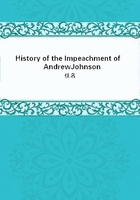
第22章 MR. JOHNSON'S ACCESSION TO THE PRESIDENCY.(9)
Mr. Johnson was a Democrat of pronounced type and profound convictions, and in no sense did he depart from his faith. He belonged to the school of Jackson and Jefferson. He had not the electric intuitions and impetuous will of the former, nor the culture and genius of the latter. He adhered more religiously to the letter of the Constitution than either. To him it was the one law of supreme obligation, that never ceased its guarantees. As fittingly expressed by one of his Counsel, Mr. Groesbeck, in the trial: "He was not learned and scholarly--not a man of many ideas or of much speculation--but the Constitution had been the study of his life, and by a law of the mind he was only the truer to that which he did know."As had Mr. Lincoln, Mr. Johnson keenly appreciated the importance of the people of the South returning at once to the Union, free and independent American citizens, clothed with all the rights, privileges and obligations common to such. In his Cabinet Councils, and to a degree supreme in that board sat William H.
Seward, as he had throughout Mr. Lincoln's administration, than whom the Republic has produced no wiser, more sagacious, or patriotic statesman. He gave the subject his intense devotion in the maturity of his great powers.
There too, sat Secretary Welles, another of Mr. Lincoln's advisers, and a devoted friend of the Constitution and the sanctity of the Union. Each of these men, thoroughly patriotic, and efficient, and untiring in the administration of their respective Departments, had commenced with the deluge of blood, and they now hoped to crown their official careers by a triumphant peace that would Honor their lives and glorify the Nation. These men had a salutary influence over Mr. Johnson, and greatly modified the asperities of his disposition.
Mr. Johnson believed, as did Mr. Lincoln, that the revolted States were still States of the Union--that all the pretended acts of secession were null and void, and that the loyal people therein had the right to reconstruct their State Governments on the basis proposed to them first by Mr. Lincoln, and after him by Mr. Johnson, and thus the right to representation in the General Government.
It was upon this question that parties divided during the reconstruction period. Mr. Lincoln, foreseeing danger in such a division, was anxious to bring those States into such relation that the people generally would consider them as virtually in the Union, without reference to the abstract question. It was with this view, undoubtedly, that he advocated the admission of Members and Senators whenever one-tenth of the voting population of 1860 should organize State Governments and ask for readmission. He would not only not countenance, but repelled the doctrine of "State Suicide," as it was called, and which came to characterize the methods of reconstruction subsequently adopted.
It is true, that on many occasions Mr. Johnson charged that the Congress was only a Congress of part of the States, and that its acts were therefore without validity. Yet he continued to execute those laws, and what to him was a very unpleasant duty, the law which set aside the State Governments organized under his own direction, so that notwithstanding his violent denunciations of the acts of Congress, and his personal opinions, he did not presume to act upon them. Angry and undignified language was uttered on both sides. Many of his speeches were violent and in bad taste and temper. So were a great many speeches uttered by senators and members of the House, and those bodies too often acted upon them.
It is therefore but repeating recorded history to say that Mr.
Johnson was earnestly seeking to carry out Mr. Lincoln's plan of reconstruction, which was upon consultation with his entire Cabinet, more especially with Mr. Stanton, adopted by him as the basis for the restoration of the revolted States.
Yet, with these facts of record, that action was afterwards assailed by the Republican leaders in and out of Congress, who assumed to have become Mr. Lincoln's executors in the work of reconstruction, as not only an abandonment of the plan instituted by him, but a surrender of the issues fought out and the results accomplished by the war just closed notwithstanding very many of these critics of Mr. Johnson had but a few months before criticised Mr. Lincoln with quite equal severity for his suggestion of this same method of restoration.
Nor will it suffice to say that, though professing submission and loyalty, the people of the South were still hostile to the Union, and that there was no safety there for Union men. It is true that there came to be violence and disorder there upon the rejection by Congress of Mr. Johnson's plan of restoration.
These were the inevitable results of the conditions. There would also have been disorder and violence in the North and to a far greater degree, had the results of the war been reversed--an arbitrary and tyrannical system of restoration insisted upon--the established order of things destroyed homes broken up the people impoverished, and hordes of unscrupulous adventurers swarmed up from the South and overrun the country in pursuit of schemes of political chicanery and personal ambition, peculation and plunder, as was the South after the close of the war.
But when the fight was on, an overwhelmingly partisan House, as a last resort, in the hope of at once ending, by removal, all opposition on the part of the President to the views and aims of the dominant party in Congress, resorted to the first project of impeachment set out in the succeeding chapter.